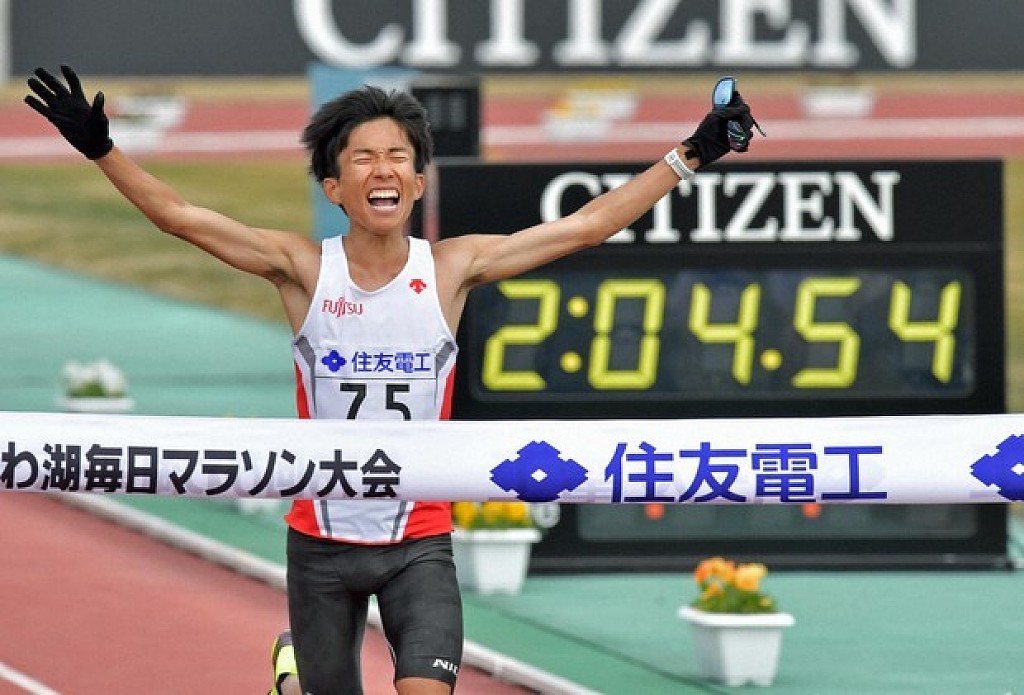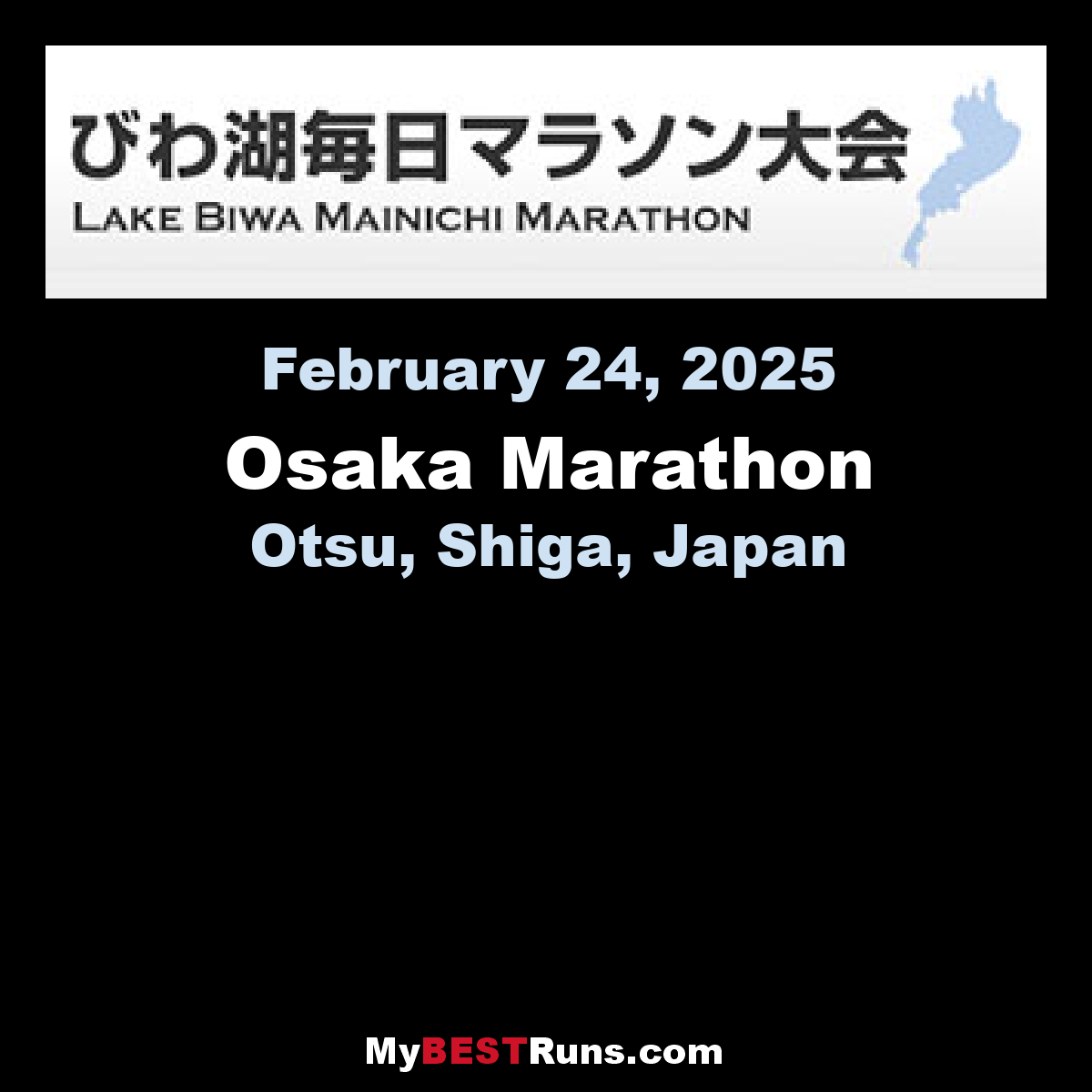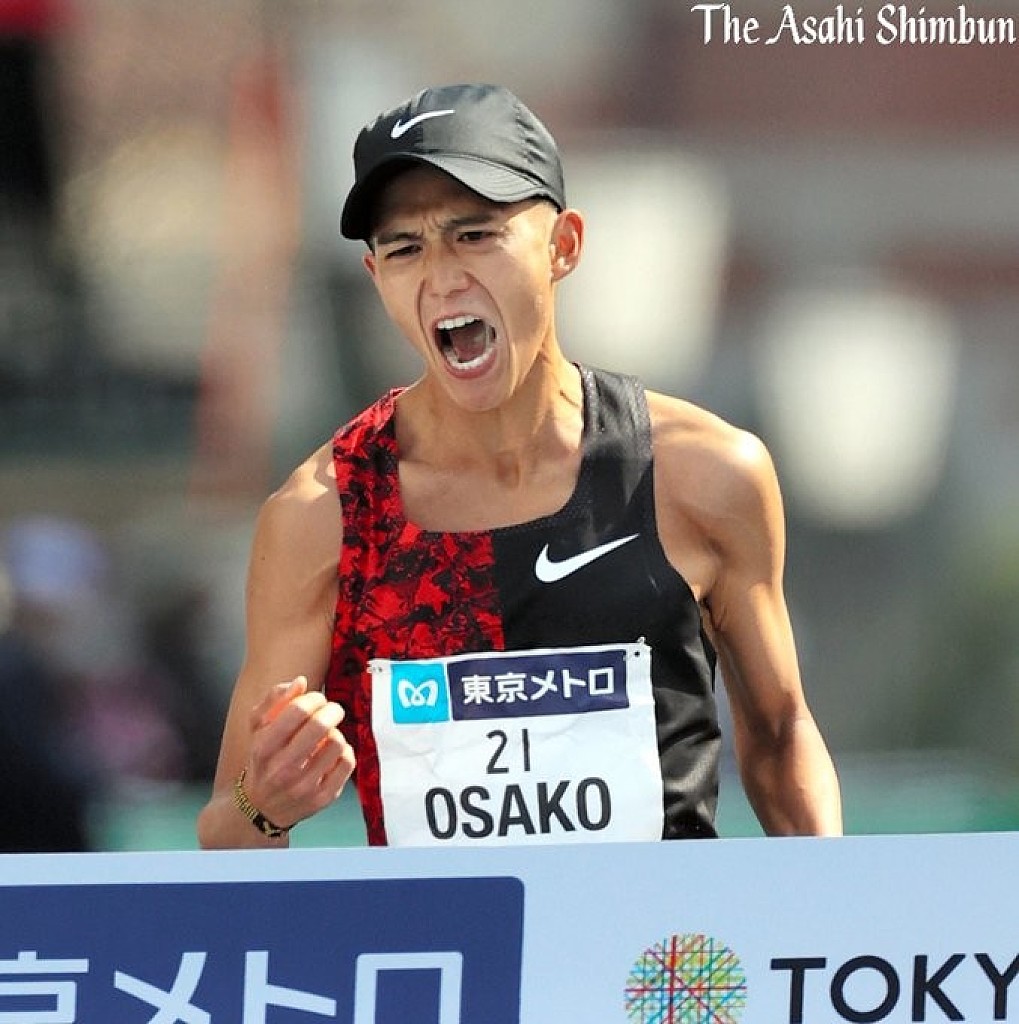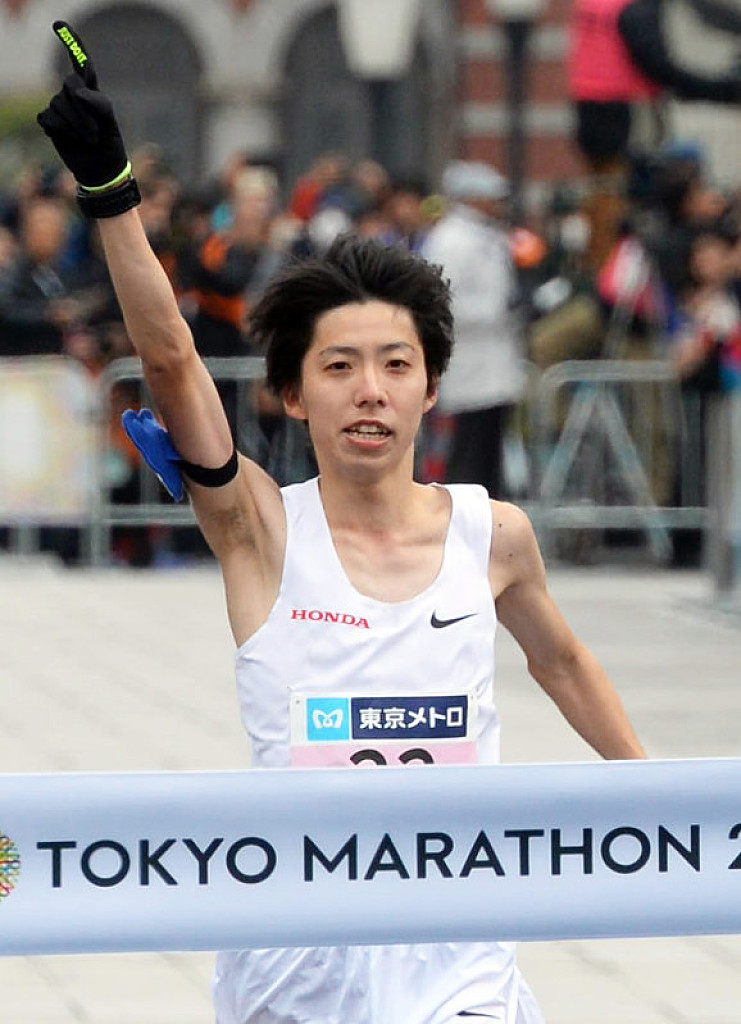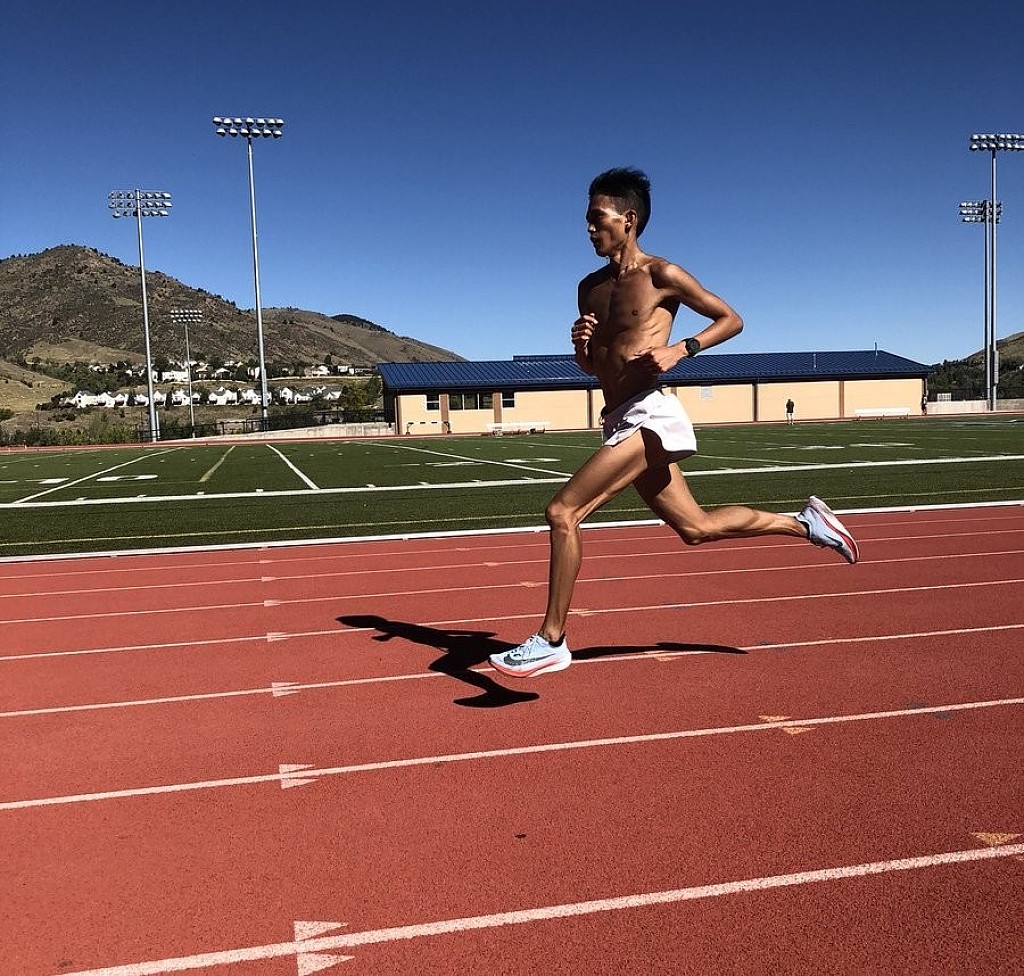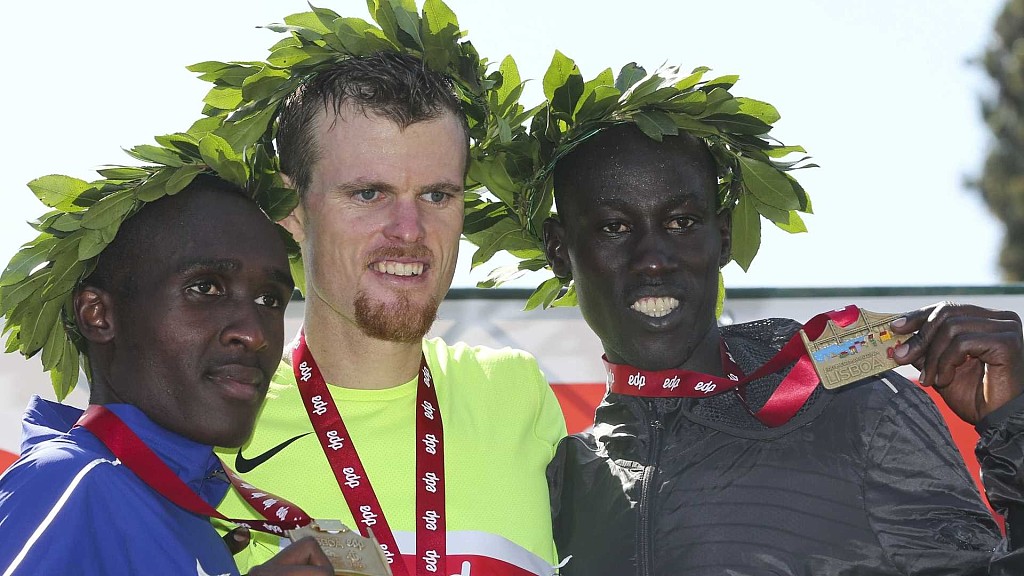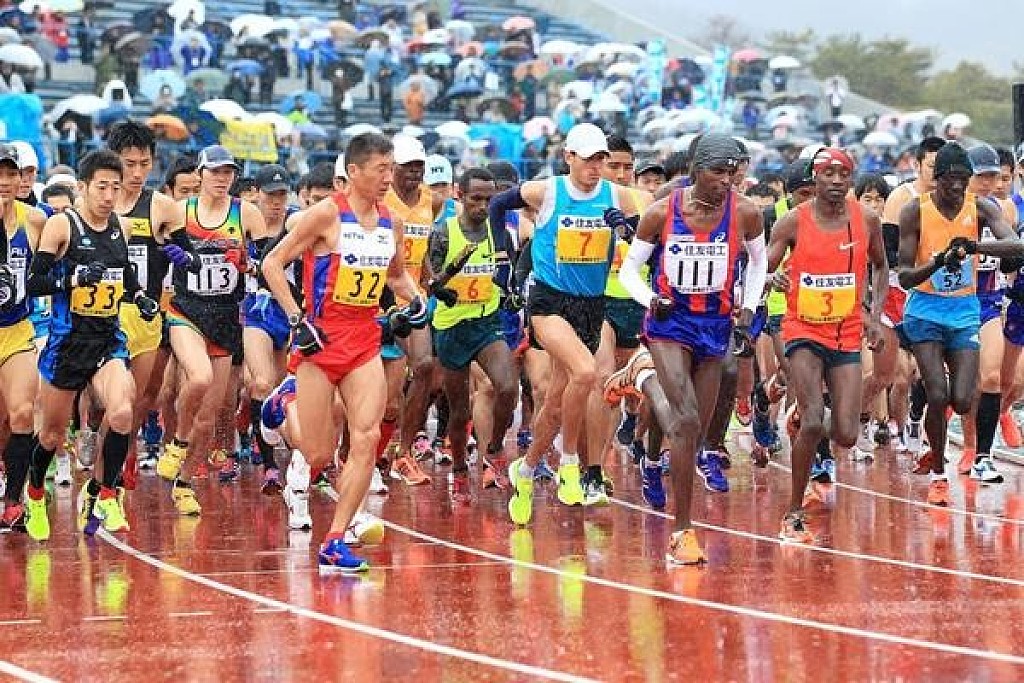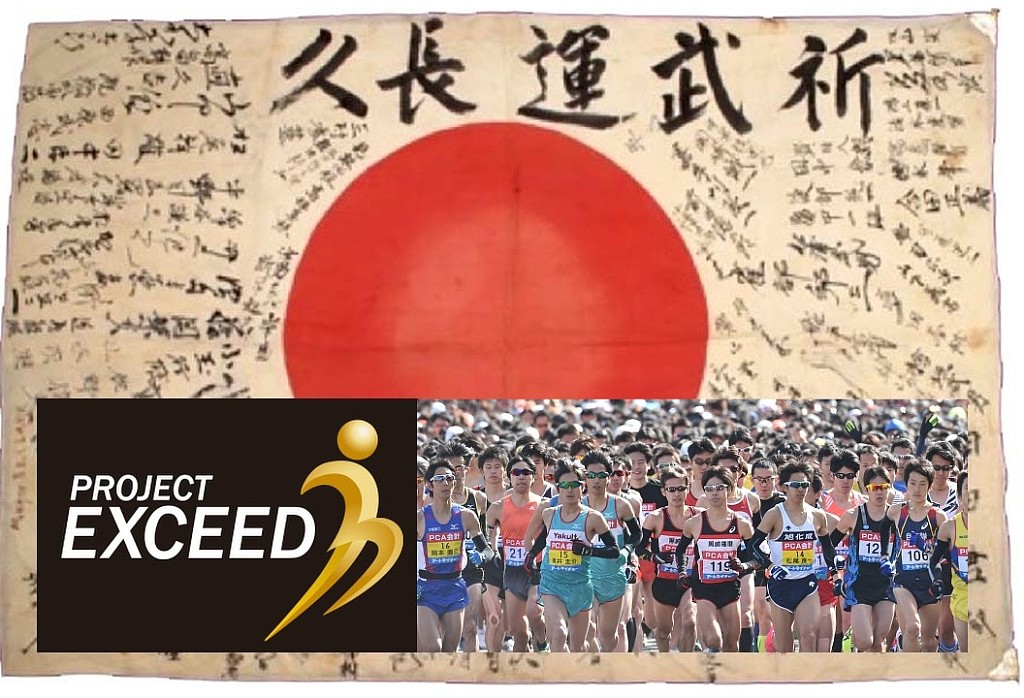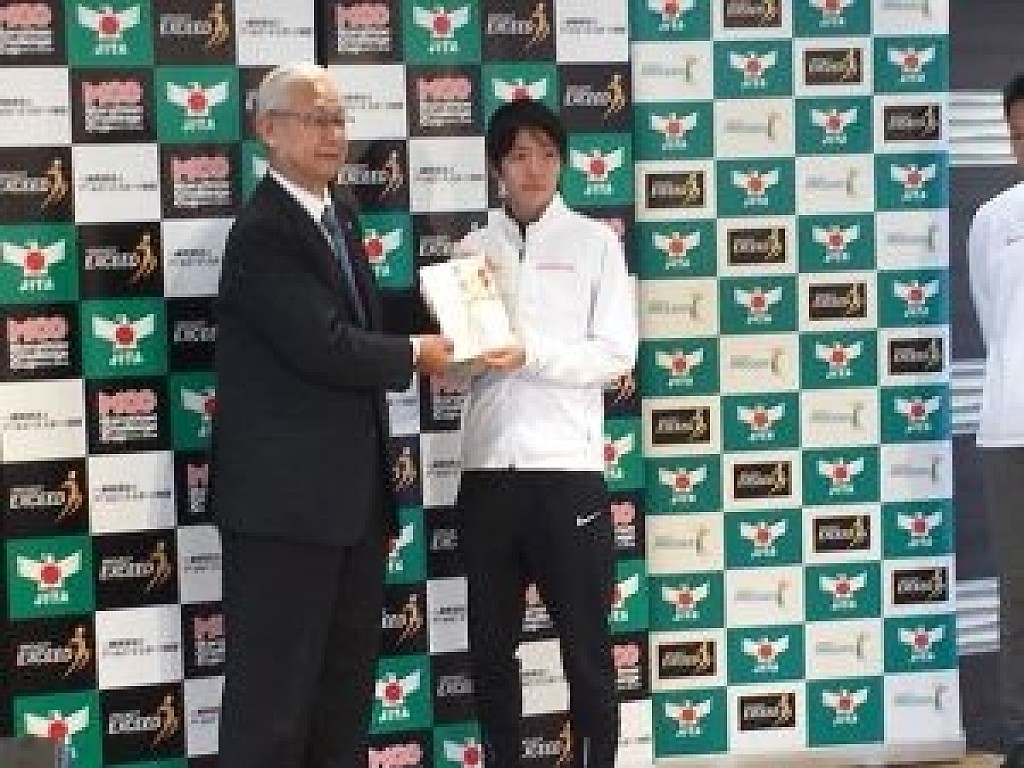Running News Daily
Running News Daily is edited by Bob Anderson. Send your news items to bob@mybestruns.com Advertising opportunities available. Train the Kenyan Way at KATA Kenya and Portugal owned and operated by Bob Anderson. Be sure to catch our movie A Long Run the movie KATA Running Camps and KATA Potato Farms - 31 now open in Kenya! https://kata.ke/
Index to Daily Posts · Sign Up For Updates · Run The World Feed
Articles tagged #Project Exceed
Today's Running News
Kengo Suzuki clocked 2:04:56 National Record to Win final Lake Biwa Mainichi Marathon
Set to be absorbed into the mass-participation Osaka Marathon as its elite men's field next year the same way the old Tokyo International Marathon was swallowed whole by the Tokyo Marathon, the Lake Biwa Mainichi Marathon wrapped its 76 years as a freestanding event with a bang, a big one, Sunday in Otsu.
Everything was on. The conditions were good, light clouds, 7ËšC, 57% humidity and light breezes at the start. The field was good, 24 men having run sub-2:10 in the last three years and 52 sub-2:12. The pacing was good, the lead trio of pacers hitting almost every split within a couple of seconds of the target 2:58/km and the second group pacers even closer to the 3:00/km target. The shoes were good, across brands.
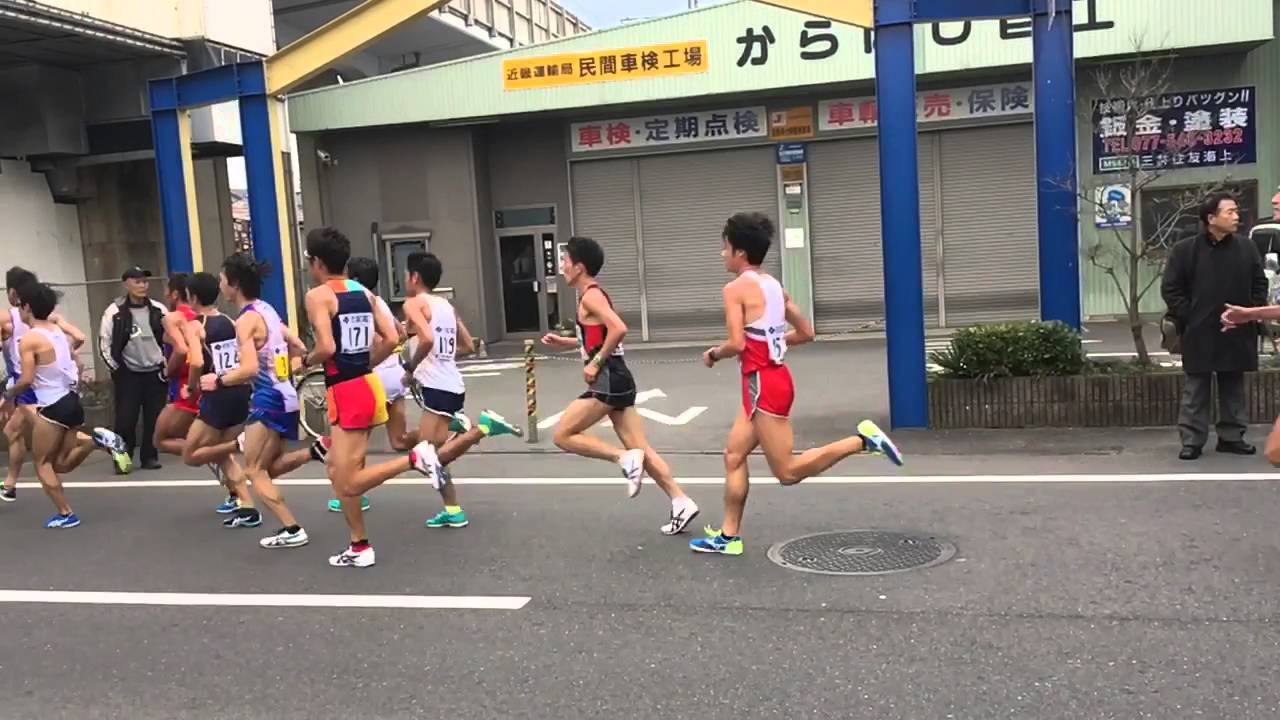
30 or so people went out on pace to go under the 2:05:29 national record in the first group, with what looked like about a hundred on mid-2:06 pace in the second group. Everything went smoothly and steadily, nature taking its course and whittling down both groups until there were only 12 left up front and a couple of dozen in the second group at 25 km when most of the pacers stepped off. Just past that point, Hiroto Inoue (Mitsubishi Juko), the second-fastest man in the field at 2:06:54, made a surge to break away. Lone remaining pacer James Rungaru (Chuo Hatsujo) took his time reeling Inoue back in, just five others still with him when he regained contact 3 km later.
When Rungaru stopped at 30 km past Ageo City Half Marathon winner Simon Kariuki (Togami Denki) took over with five Japanese men, Kengo Suzuki (Fujitsu), Hidekazu Hijikata (Honda), Shuho Dairokuno (Asahi Kasei), Masato Kikuchi (Konica Minolta) and Inoue, strung out single-file behind him. Kariuki slowed slightly to 2:59-3:00/km, but even so Dairokuno, Kikuchi and Inoue started to strain and lose touch. Suzuki and Hijikata, on the other hand, were even smoother and calmer than Kariuki, staying right there behind him.
The only changes until just after 36 km were the gap between the front and back trios widening and Suguru Osako's NR starting to slip out of reach. But at the 36 km drink station Suzuki made his move, one that will be studied for years to come. As they approached the #6 special drink table where Kariuki's bottle waited, Suzuki pulled out from behind him to his right. Just as Kariuki looked to his left to grab his bottle Suzuki attacked, and when Kariuki looked back up the gap was already about 5 m.
It was brilliant. And Suzuki, the 2017 National University Half Marathon champ in 1:01:36 and 2017 World University Games half marathon silver medalist and who made a similar move near 20 km in the MGC Race Olympic trials that ultimately helped his older teammate Shogo Nakamura win, was just getting going. For almost every one of the final 6 km he split in the 2:51~53/km range, bringing the NR back into sight, then 2:05:15, then 2:05:00.
With a final surge in the last 200 m of the track he stopped the clock at 2:04:56, the first Japanese man to break 2:05, 1:17 under former world record holder Wilson Kipsang's course record, and a PB by 5 and 1/2 minutes. "I didn't expect this kind of time at all," he said post-race. "In my other marathons to date I've slowed down in the last part, so the focus today was on finishing hard. I knew that was the right time to make my move." Still just 25, Suzuki's career goal is the Paris Olympics. Unluckily for him, the Project Exceed 100 million yen bonus program for a new national record has already run out. Let's hope he's got another chance to earn that kind of payday before Paris.
Behind him, Hijikata, only 23 and running just his second marathon after a 2:09:50 debut in Tokyo last year right before his graduation from Koku Gakuin University, dropped Kariuki for 2nd in 2:06:26. Likewise doing his second marathon after a 2:28:47 debut at Lake Biwa last year, 25-year-old Kyohei Hosoya (Kurosaki Harima) ran almost perfectly even splits, going through halfway in 1:03:21 to come up from the second group and run down Kariuki, Inoue, Dairokuno and half marathon NR holder Yusuke Ogura (Yakult) for 3rd in 2:06:35. Both Inoue and Ogura held on for sub-2:07 PBs, Inoue 4th in 2:06:47 and Ogura 5th in 2:06:51.
And behind them, the hits kept coming. 10 men ran 2:07. 13 ran 2:08. 14 ran 2:09. Almost all were PBs or debuts. 28 men sub-2:09, 42 sub-2:10. 174 men sub-2:20, the most ever, anywhere, by a long shot. With no Beppu-Oita, Nobeoka or Tokyo this season that may have been a factor of Lake Biwa being the only game in town, but still, can you believe those numbers, even with the usual Japanese depth? With the shoes these days times might not be worth what they used to be, but even if you factor in a couple of minutes this was about as good a demonstration of the sheer depth of quality of the marathon development system here as you could ask for.
And between that and a great race up front it was the perfect sendoff for Japan's oldest marathon before it disappears next year into the maw of Osakan modernity. Farewell, Lake Biwa. Long may you run.
Login to leave a comment
Osaka Marathon
In 2022 the Lake Biwa Mainichi Marathon and Osaka Marathon were held together. For 2023 the name of the marathon will be Osaka and both men and women can run the race. The original male-only competition was first held in 1946 and, having taken place every year since then, it is Japan's oldest annual marathon race. The early editions of...
more...Birhanu Legese win the Tokyo Marathon clocking 2:04:15 while Suguru Osako sets a new Japanese record with 2:05:29
The Tokyo marathon mass race was cancelled because of the worldwide panic concerning the Coronavirus. However, the elite race took place as scheduled. What a race it was. Perfect running weather. Birhanu Legese from Ethiopia was the overall winner clocking 2:04:15. He also won last year.
Suguru Osako was the first Japanese across the line setting a new national record with 2:05:29. This giving him a big pay day. Lonah Cemtai Salpeter set a new course record in winning the women's race clocking 2:17:45. Legese, wearing Nike's much-discussed carbon-plated shoes, hit the front before the 40 kilometre mark, winning by more than half a minute but missing out on Wilson Kipsang's 2017 record of 2:03.58.
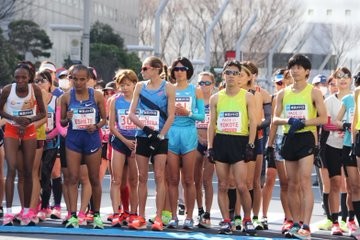
Somali-born Belgian Bashir Abdi (2:04.49) pipped Ethiopian Sisay Lemma (2:04.51) to second place in a race for the line.
Japan's Suguru Osako finished fourth in 2:05.29, improving his own national record by 21 seconds and locking up Japan's third and final spot in the men's field for the Tokyo Olympics later this year.
Lonah Korlima Chemtai Salpeter, who runs for Israel, won the women's race in a record time of 2:17.45, 50 seconds ahead of Birhane Dibaba with her fellow Ethiopian Sutume Asefa Kebede a distant third two minutes back.
Sarah Chepchirchir owned the previous women's record of 2:19:47 from the 2017 race.
Suguru Osako's national record brought him a 100 million yen bonus (US$950,000) from the Japan Corporate Track and Field Federation as part of their "Project Exceed" initiative to improve performances in the build-up to the Olympics Games. "It is not clear if the same person can be paid the bonus twice," says Bob Anderson, MBR editor. "This is still being confirmed."
Suguru Osako (ÅŒsako Suguru, born 23 May 1991) is a Japanese long-distance runner. He won the 10,000 metres gold medal at the 2011 Summer Universiade in Shenzhen and holds the Asian junior record for the half marathon. He held the Japanese National Record for the marathon of 2:05.50 set at the 2018 Chicago Marathon, where he finished third.
Login to leave a comment
Tokyo Marathon
The Tokyo Marathon is a world-renowned annual marathon held in Tokyo, Japan. As one of the prestigious Abbott World Marathon Majors, it attracts elite and amateur runners from around the globe. The race holds World Athletics Platinum Label status, recognizing its high competitive standards, top-tier organization, and international appeal. Sponsored by Tokyo Metro, the Tokyo Marathon has grown into one...
more...Japanese Yuta Shitara will Go For National Record in Tokyo Marathon, I Care About the 100 Million Yen Bonus More Than the Olympics, he says
There's a lot of attention right now on the last remaining spot on the 2020 Olympic marathon team. The first two spots were secured by the 1st and 2nd-placers at the MGC Race, Shogo Nakamura (Fujitsu) and Yuma Hattori (Toyota).
To claim the last remaining spot, someone has to break the Japanese national record and run at least 2:05:49 at this winter's Fukuoka International Marathon, Tokyo Marathon or Lake Biwa Mainichi Marathon. If nobody succeeds, the spot will go to MGC 3rd-placer and current national record holder Suguru Osako (ex-Nike Oregon Project).The favorite to pull it off, after his run at East Japan Shitara talked about his plans for next year's Tokyo Marathon. But he did so in a characteristically Shitaresque way. "As long as you're competing in sports, [the Olympics] are something you aim for," he said.
"I'm running the Tokyo Marathon next year, but I don't really care that much about the Olympics. I care more about getting the 100 million yen bonus [$920,000 USD]. That's my priority. I'm running it for the money. The MGC Race didn't have any prize money, and I'm living right now because I can run. It takes money to run."Making clear his focus on scoring the Project Exceed bonus for breaking the marathon national record again, Shitara seemed to suggest that if he succeeds in winning a place on the 2020 Olympic team he might turn it down. "
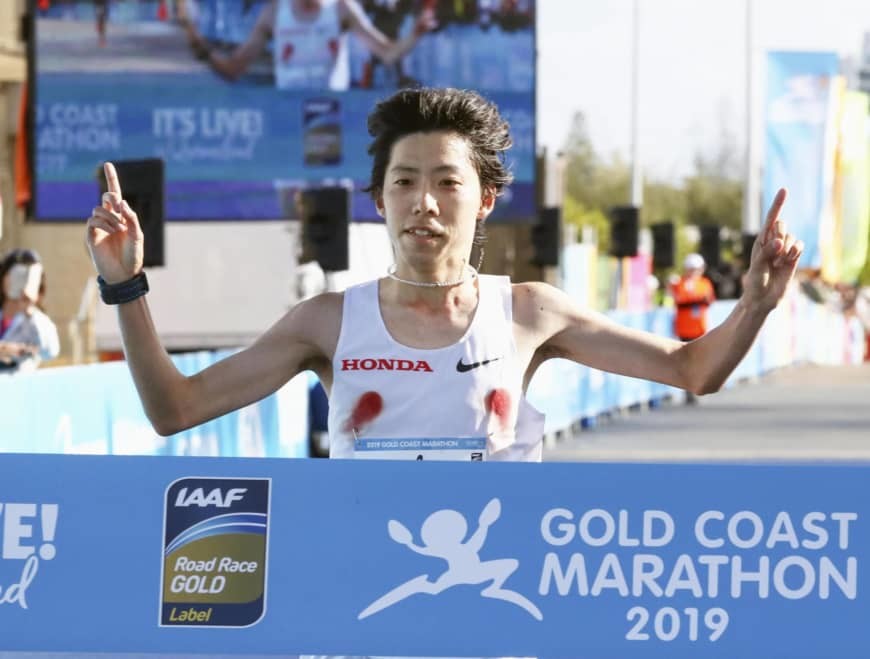
"I'm not going to say myself that I'll run [the Olympics]," he said. "The public would probably rather see Osako run there. He's got better achievements in international competitions.
He'd definitely get the job done, and if you leave it to him there won't be any doubt. I'll leave it to the public to decide." Of the Olympic marathon's move to Sapporo he said, "If that's what has been decided then there's no choice but to obey."Now 27 years old with his own unique way of looking at the world, Shitara expressed a sense of frustration with the current state of the marathon as an event. "It's really boring to run all these races set up by old people these days," he said. "I think we're going into an era when change is going to come from the athletes.
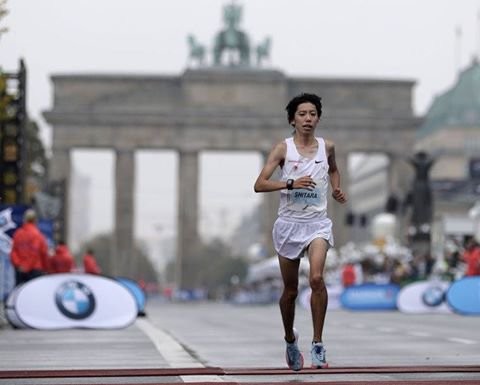
I want to change, and I can't wait for that day to come." The first step is to try to score his second 100 million yen bonus in Tokyo. "It's a race against Osako's record," he said. "I'll be going for it as long as I can run."
Login to leave a comment
Tokyo Marathon
The Tokyo Marathon is a world-renowned annual marathon held in Tokyo, Japan. As one of the prestigious Abbott World Marathon Majors, it attracts elite and amateur runners from around the globe. The race holds World Athletics Platinum Label status, recognizing its high competitive standards, top-tier organization, and international appeal. Sponsored by Tokyo Metro, the Tokyo Marathon has grown into one...
more...Japan's Suguru Osako wins nearly one Million Dollars in placing third at the Chicago Marathon
Japan's Suguru Osako placed third at the 2018 Chicago Marathon clocking 2:05:50, a new national Japan record.
This beats the record of 2:06:11. The Japanese Corporate Track and Field Federation (Project Exceed program) will pay him a 100-million-yen bonus ($879,465 U.S. dollars) for setting a new national record.
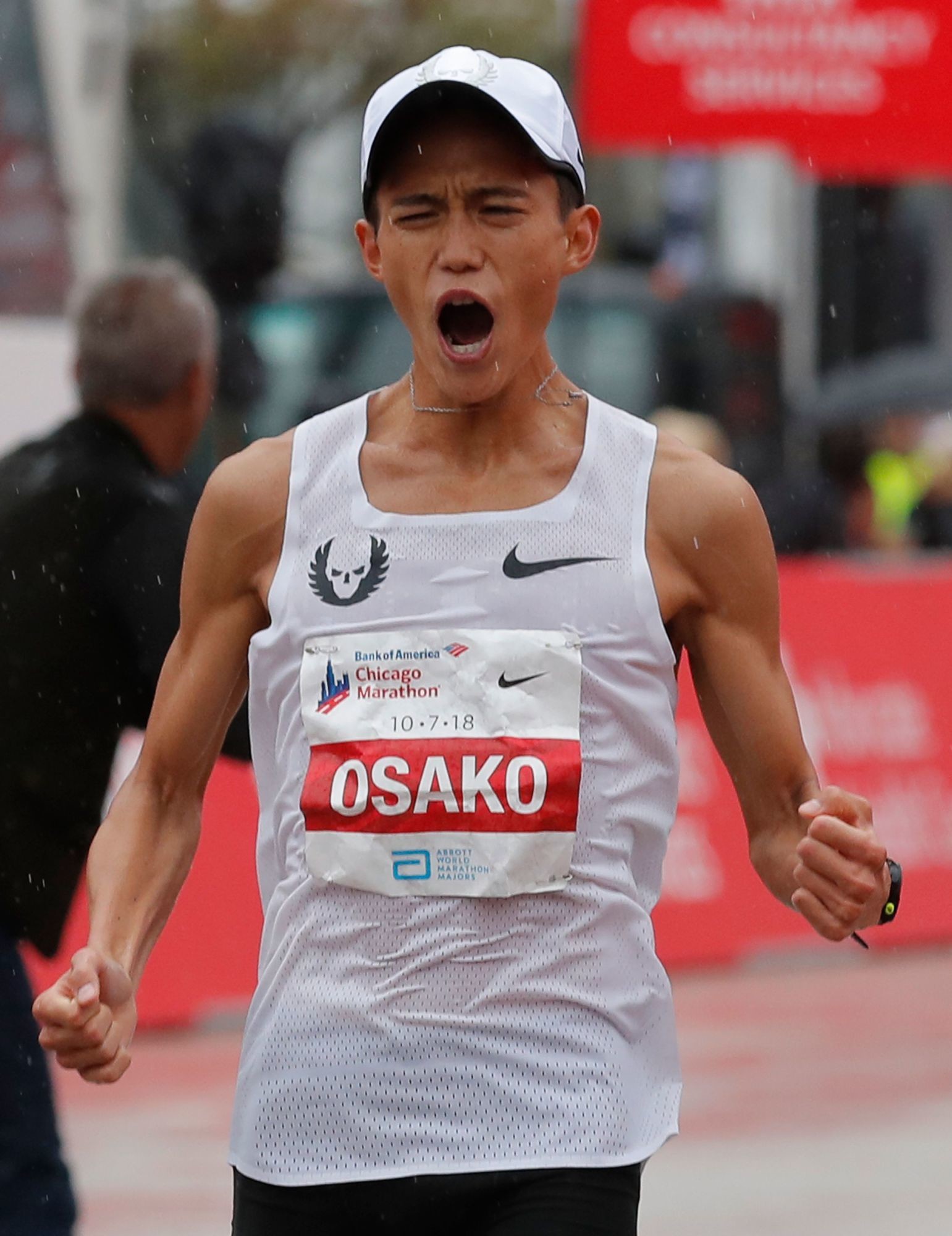
Before the race Suguru Osako said, ““I want to try to break the national record, but the most important thing to me is to be competitive with the other runners. IÂ’ am really excited and proud to run with Mo and Galen. I’m going to enjoy the challenge.””
Osako trains in Oregon and is part of the Nike Oregon Project. Osako was born May 23, 1991. He won the 10,000 meters gold medal at the 2011 Summer Universiade in Shenzhen and holds the Asian junior record for the half marathon. Born in Machida, Tokyo, he attended Saku Chosei High School and began to establish himself nationally in 2010.
Suguru Osako made his marathon debut at the 2017 Boston Marathon, landing on the podium in third in 2:10:28. At the time, he was the first Japanese man to finish among the top three since Seko won Boston in 1987.
He closed out 2017 with an impressive personal best and third place finish at the Fukuoka Marathon, 2:07:19. He becomes the first Japanese man and just the second non-African-born runner to break 2:06.
Login to leave a comment
New Zealander Jake Robertson Long-awaited Marathon Debut Sunday
Login to leave a comment
Japan’s Project Exceed Program has Japanese Runners hyped up...next chance to be a millionaire is Sunday
Login to leave a comment
There has never been this much money put on the table for marathoners and their coaches
Login to leave a comment
Details of Japan's Project Exceed and the Million Dollar Payout
Login to leave a comment


